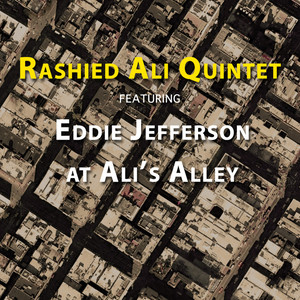
Eddie Jefferson at Ali's Alley
- 流派:Jazz 爵士
- 语种:英语
- 发行时间:2009-09-10
- 类型:录音室专辑
- 歌曲
- 时长
简介
Rashied Ali (1 July 1935-12 August 2009) in Philadelphia, Pennsylvania, was an American free jazz and avant-garde jazz drummer best known for playing with John Coltrane in the last years of Coltrane's life. Ali moved to New York in 1963 and worked in groups with Bill Dixon and Paul Bley. He has also recorded or performed with Pharoah Sanders, Alice Coltrane, Arthur Rhames, James Blood Ulmer and many others. In addition, Ali was scheduled to be the second drummer, alongside Elvin Jones, on John Coltrane's landmark free jazz album Ascension, but he dropped out just before the recording was to take place. Coltrane did not replace him, and settled for one drummer. Ali began to record with Coltrane from Meditations in November 1965 onwards. Among his credits are the last recorded work of John Coltrane's life (The Olatunji Concert) and Interstellar Space, an album of duets with Coltrane recorded earlier in 1967. Ali "became important in stimulating the most avant-garde kinds of jazz activities". During the early 1970s, he ran an influential loft club in New York, called Ali's Alley. Ali has lead groups featuring several generations of young musicians. Eddie Jefferson (3 August 1918 - 9 May 1979) was a celebrated jazz vocalist and lyricist. Although there were a couple obscure early examples (Bee Palmer in 1929 and Marion Harris in 1934, both performing "Singing the Blues"), Eddie Jefferson is considered the founder, and premier performer of vocalese, the art of taking a recording and writing words to the solos, which Jefferson was practicing as early as 1949. Eddie Jefferson's first career was as a tap dancer but in the bebop era he discovered his skill as a vocalese lyricist and singer. He wrote lyrics to Charlie Parker's version of "Parker's Mood" and Lester Young's "I Cover the Waterfront" early on, and he is responsible for "Moody's Mood for Love" (based on James Moody's alto solo on "I'm in the Mood for Love"). King Pleasure recorded "Moody's Mood for Love" before Jefferson (getting the hit) and had his own lyrics to "Parker's Mood," but in time Jefferson was recognized as the founder of the idiom. Jefferson worked with James Moody during 1955-1957 and again in 1968-1973 but otherwise mostly performed as a single. He first recorded in 1952 (other than a broadcast from 1949) and those four selections are on the compilation The Bebop Singers. During 1961-1962 he made a classic set for Riverside that is available as Letter from Home and highlighted by "Billie's Bounce," "I Cover the Waterfront," "Parker's Mood," and "Things Are Getting Better." Jefferson recorded a pair of albums for Prestige during 1968-1969. Body and Soul includes "So What" (the original Miles Davis version), "Body and Soul" (paying tribute to Coleman Hawkins), "Now's the Time" and some current material such as "Mercy, Mercy, Mercy." Come Along with Me is highlighted by "The Preacher," "Yardbird Suite," and "Baby Girl" (based on Lester Young's "These Foolish Things").

